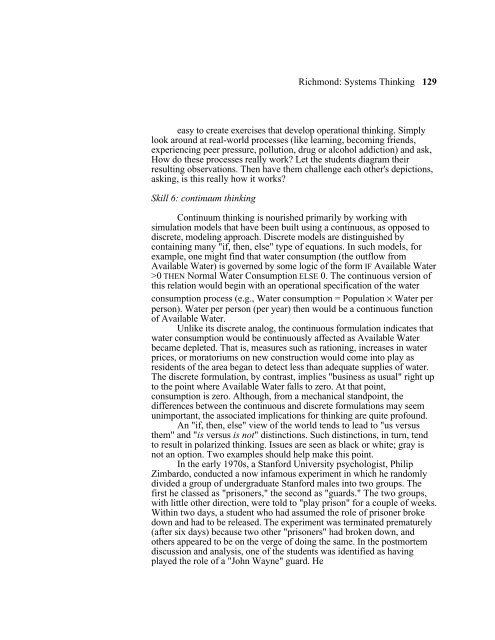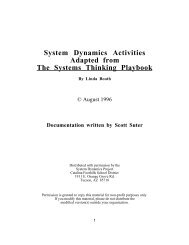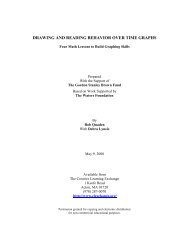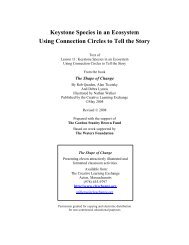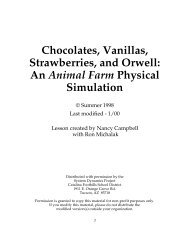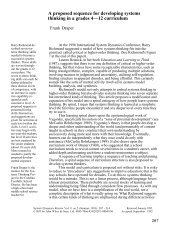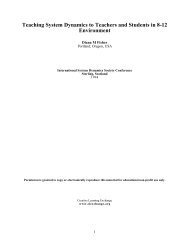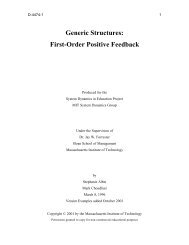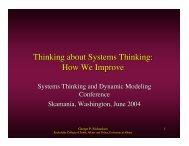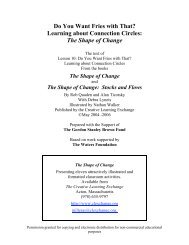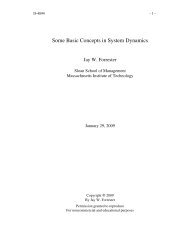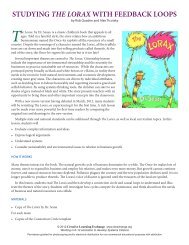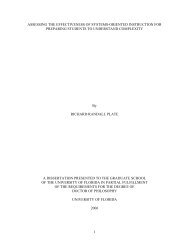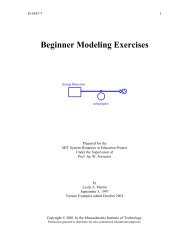Systems thinking: critical thinking skills for the 1990s and beyond
Systems thinking: critical thinking skills for the 1990s and beyond
Systems thinking: critical thinking skills for the 1990s and beyond
- No tags were found...
You also want an ePaper? Increase the reach of your titles
YUMPU automatically turns print PDFs into web optimized ePapers that Google loves.
Richmond: <strong>Systems</strong> Thinking 129easy to create exercises that develop operational <strong>thinking</strong>. Simplylook around at real-world processes (like learning, becoming friends,experiencing peer pressure, pollution, drug or alcohol addiction) <strong>and</strong> ask,How do <strong>the</strong>se processes really work? Let <strong>the</strong> students diagram <strong>the</strong>irresulting observations. Then have <strong>the</strong>m challenge each o<strong>the</strong>r's depictions,asking, is this really how it works?Skill 6: continuum <strong>thinking</strong>Continuum <strong>thinking</strong> is nourished primarily by working withsimulation models that have been built using a continuous, as opposed todiscrete, modeling approach. Discrete models are distinguished bycontaining many "if, <strong>the</strong>n, else" type of equations. In such models, <strong>for</strong>example, one might find that water consumption (<strong>the</strong> outflow fromAvailable Water) is governed by some logic of <strong>the</strong> <strong>for</strong>m IF Available Water>0 THEN Normal Water Consumption ELSE 0. The continuous version ofthis relation would begin with an operational specification of <strong>the</strong> waterconsumption process (e.g., Water consumption = Population × Water perperson). Water per person (per year) <strong>the</strong>n would be a continuous functionof Available Water.Unlike its discrete analog, <strong>the</strong> continuous <strong>for</strong>mulation indicates thatwater consumption would be continuously affected as Available Waterbecame depleted. That is, measures such as rationing, increases in waterprices, or moratoriums on new construction would come into play asresidents of <strong>the</strong> area began to detect less than adequate supplies of water.The discrete <strong>for</strong>mulation, by contrast, implies "business as usual" right upto <strong>the</strong> point where Available Water falls to zero. At that point,consumption is zero. Although, from a mechanical st<strong>and</strong>point, <strong>the</strong>differences between <strong>the</strong> continuous <strong>and</strong> discrete <strong>for</strong>mulations may seemunimportant, <strong>the</strong> associated implications <strong>for</strong> <strong>thinking</strong> are quite profound.An "if, <strong>the</strong>n, else" view of <strong>the</strong> world tends to lead to "us versus<strong>the</strong>m" <strong>and</strong> "is versus is not" distinctions. Such distinctions, in turn, tendto result in polarized <strong>thinking</strong>. Issues are seen as black or white; gray isnot an option. Two examples should help make this point.In <strong>the</strong> early 1970s, a Stan<strong>for</strong>d University psychologist, PhilipZimbardo, conducted a now infamous experiment in which he r<strong>and</strong>omlydivided a group of undergraduate Stan<strong>for</strong>d males into two groups. Thefirst he classed as "prisoners," <strong>the</strong> second as "guards." The two groups,with little o<strong>the</strong>r direction, were told to "play prison" <strong>for</strong> a couple of weeks.Within two days, a student who had assumed <strong>the</strong> role of prisoner brokedown <strong>and</strong> had to be released. The experiment was terminated prematurely(after six days) because two o<strong>the</strong>r "prisoners" had broken down, <strong>and</strong>o<strong>the</strong>rs appeared to be on <strong>the</strong> verge of doing <strong>the</strong> same. In <strong>the</strong> postmortemdiscussion <strong>and</strong> analysis, one of <strong>the</strong> students was identified as havingplayed <strong>the</strong> role of a "John Wayne" guard. He


